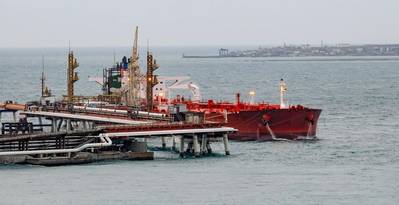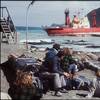Russian Oil Tankers Not Targeted in EU Sanctions Proposal -EU Diplomats
Russian oil tankers are not targeted in the European Commission's proposal for tightening the implementation of a price cap on the country's crude oil, EU diplomats said on Wednesday.
The Financial Times reported earlier on Wednesday that Denmark will be tasked with inspecting and potentially blocking Russian oil tankers sailing through its waters under new European Union plans as a way of enforcing a $60 per barrel price cap on Moscow's crude.
The FT said that Denmark would target tankers carrying Russian oil that did not have Western insurance, a step that would hit Russian oil export income hard while snarling up the entire Russian oil production and refinery business.
"We have seen nothing about it in the Commission proposal," one EU diplomat familiar with the Commission text said and two others confirmed they found no such reference in the proposal.
Russia sends about a third of its seaborne oil exports, or 1.5% of global supply, through the Danish straits so any attempt to halt those supplies would send oil prices higher and trigger a confrontation with Russia.
Since Russia's full-scale invasion of Ukraine in February 2022, the West has tried to cripple the Russian economy, but Russia, the world's second-largest oil exporter, has continued to sell its oil to world markets using fleets of tankers based and insured outside the West.
The Danish government did not reply to requests for comment.
Three maritime experts said blocking commercial vessels in the Danish straits would be contrary to fundamental rules of the sea, including the U.N. Convention on the Law of the Sea, which governs marine traffic.
Denmark would only have the right to stop a vessel if it posed an obvious threat, they said.
"Denmark has never done anything like that before. Blocking commercial traffic in the Danish straits would come close to a declaration of war," said Hans Peter Michaelsen, an independent defense analyst.
"And it would not be a simple task for the Danish navy. We have small Diana class vessels patrolling our waters, but they will look like lifeboats next to an oil tanker," he said.
When asked about the FT report, Kremlin spokesman Dmitry Peskov said he did not have information contained in the report, but cautioned that shipping rules should be observed.
"Everyone should be cautioned in advance about the need to comply with all the rules of international commercial shipping," Peskov told reporters.
When asked whether Russia would consider sending warships to escort tankers carrying Russian oil if Denmark tried to block the route, Peskov said Russia did not take such serious decisions based merely on unconfirmed newspaper reports.
"Are you proposing discussing such serious things based on the publication of a newspaper that does not even have a link to anyone specific?" Peskov said. "Let's wait for tangible information, and then we'll talk about what to do."
Russia exports its flagship Urals oil grade via the ports of Primorsk and Ust-Luga. Tankers thread through the Danish straits and then on to world markets.
Before the war in Ukraine, all Russian oil exports from the Baltic Sea were shipped to Europe. Since then, the bulk has gone to India, China, Egypt and Turkey.
The FT cited a spokesman for the Danish defence command as saying: "In short, we don't check paperwork or ships passing or sailing through the straits, unless it has to do with safety at sea."
The Group of Seven countries, the European Union and Australia imposed a $60 per barrel cap last December on sea-borne exports of Russian crude due to the conflict in Ukraine, but a rally in global oil prices this year has meant much of Russian oil has traded above the cap.
(Reuters - Reporting by Shubham Kalia; Dmitry Antonov, Vladimir Soldatkin, Louise Rasmussen and Jacob Gronholt-Pedersen; Writing by Guy Faulconbridge; Editing by Sharon Singleton and Mark Potter)














